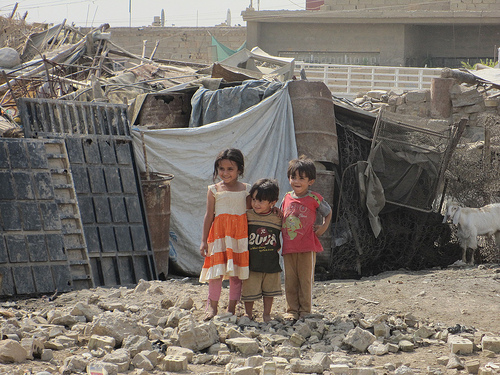
Internally displaced children in Iraq. (Photo: Dave Malkoff/flickr)
President Obama’s speech to the nation on the official end of the American combat mission in Iraq neglected a major consequence of the war: hundreds of thousands of Iraqi refugees now scattered around the world.
Refugees International calculates that there are at least 1.5 million displaced Iraqis within Iraq, 500,000 of whom live in slums on the outskirts of cities. About half a million more Iraqi refugees are living in the region, mostly in Syria and Jordan. Though they are not confined to refugee camps, many have been unable to obtain work permits in their host countries, and suffer financially as a result. They’re between a rock and a hard place: scrambling to make a living outside Iraq, but unable to return because they might be killed. Many hope they will make it to the U.S. one day, the country that started the war that drove them from their homes.
In fact, the U.S. has admitted about 50,000 Iraqi refugees, with an emphasis on those who are most vulnerable: women; people who helped the American war effort; and those who suffered intense persecution. But as Fi2W reported, resettlement has been a rough transition, since social services are few for the refugees when they arrive. When speaking of this issue to the Commission on Security and Cooperation in Europe, the President of Refugees International, L. Craig Johnstone, said, “Resettlement should be a real durable solution for refugees, not an experience that brings more hardship.”
As the U.S. adjusts to ending the war and bringing our troops home, its important that we pay attention to the Iraqis who have no other home now besides America.
AboutSarah Kate Kramer
Sarah Kate Kramer first got hooked on collecting stories as a StoryCorps facilitator, then traveled the world with a microphone for a few years before settling down in her hometown of New York City. From 2010-2012 she was the editor of Feet in 2 Worlds and a freelance reporter for WNYC Radio, where she created “Niche Market,” a weekly segment that profiled specialty stores in New York. Sarah is now a producer at Radio Diaries, a non-profit that produces documentaries for NPR and other public radio outlets.


Internally displaced children in Iraq. (Photo: Dave Malkoff/flickr)
President Obama’s speech to the nation on the official end of the American combat mission in Iraq neglected a major consequence of the war: hundreds of thousands of Iraqi refugees now scattered around the world.
Refugees International calculates that there are at least 1.5 million displaced Iraqis within Iraq, 500,000 of whom live in slums on the outskirts of cities. About half a million more Iraqi refugees are living in the region, mostly in Syria and Jordan. Though they are not confined to refugee camps, many have been unable to obtain work permits in their host countries, and suffer financially as a result. They’re between a rock and a hard place: scrambling to make a living outside Iraq, but unable to return because they might be killed. Many hope they will make it to the U.S. one day, the country that started the war that drove them from their homes.
In fact, the U.S. has admitted about 50,000 Iraqi refugees, with an emphasis on those who are most vulnerable: women; people who helped the American war effort; and those who suffered intense persecution. But as Fi2W reported, resettlement has been a rough transition, since social services are few for the refugees when they arrive. When speaking of this issue to the Commission on Security and Cooperation in Europe, the President of Refugees International, L. Craig Johnstone, said, “Resettlement should be a real durable solution for refugees, not an experience that brings more hardship.”
As the U.S. adjusts to ending the war and bringing our troops home, its important that we pay attention to the Iraqis who have no other home now besides America.
AboutSarah Kate Kramer